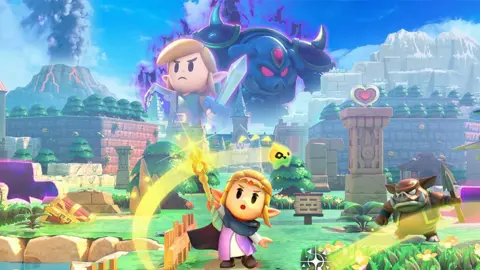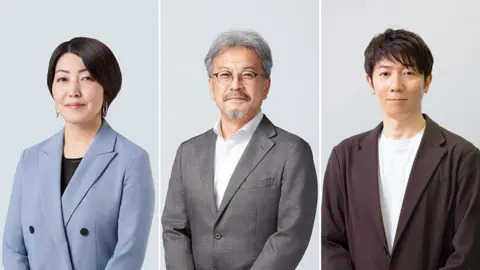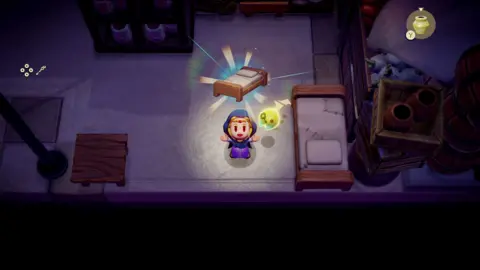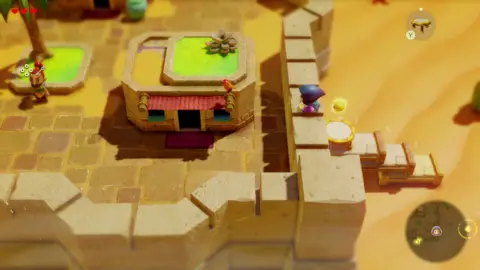 Nintendo
NintendoPrincess Zelda is one of Nintendo’s best-known characters, but she’d never starred in one of its games until this year.
Despite lending her name to the Legend of Zelda series, she’d always played a supporting role behind regular hero Link.
That all changed with Echoes of Wisdom, released a few weeks ago.
BBC Newsbeat caught up with series producer Eiji Aonuma and the game’s directors, Tomomi Sano and Satoshi Terada, to find out about making the game and their reaction to its launch.
A nervous reveal
 Nintendo
NintendoEchoes of Wisdom was a complete surprise when it was announced at the Nintendo Direct showcase in June.
Fans were quick to realise the significance of a game starring the princess as the main character.
But it also introduced a new play style for the series.
Rather than being equipped with a sword and shield, as in previous Legend of Zelda games, the main character has the ability to copy items and enemies found during their quest.
Known as echoes, these items can then be spawned or “pasted” into the world, allowing players to come up with solutions to obstacles and puzzles.
You might stack beds and boxes to scale a wall, or unleash several enemies to attack one of the game’s bosses.
Series producer Aonuma acknowledges “a lot of the focus of the topic of conversation was going to be on Zelda being the main protagonist”.
But, he says, a bigger concern for him was “whether or not the unique gameplay of the echoes was going to be conveyed properly and understood properly by the viewers”.
It’s a feeling shared by directors Terada and Sano.
“Whether or not the Zelda fans would accept these new elements was something I was watching over nervously,” says Terada, chief of third-party co-developer Grezzo.
Sano says she was “relieved to see that it was being accepted positively, and was really watching closely over my smartphone to see people’s reactions the following day as well”.
Getting used to a new Zelda
 Nintendo
NintendoSince getting their hands on the new game, some players have reported taking a while to get to grips with the new system.
Aonuma, who says he completed Echoes of Wisdom eight times during its development, admits that he had similar feelings on his first playthrough.
“From the second time through I sort of realised that there’s various ways and methods of overcoming these puzzles and overcoming the challenges,” he says.
Aonuma says experimenting with different methods helped him to change his experience.
“And so I think that realisation that you can do various things and there are various ways to overcome and solve these puzzles is sort of a turning point of whether you become used to using the echoes in the new game system.”
They do watch your videos
 Nintendo
NintendoRecent Zelda games have given players much more room to be creative and test the limits of what they can do, with some sharing the results online.
Last year’s Tears of the Kingdom, for example, allowed players to build strange contraptions and led to memorable creations such as a giant robotic Godzilla.
Terada says that the team spent a lot of time testing Echoes of Wisdom’s various combinations, but even they were surprised once people got their hands on it.
“Seeing how players are using it, I was really amazed at people’s imaginations,” he says.
The developers admit they were impressed by one trick that’s been widely shared, of players combining a bed with a tornado to propel Zelda into the air.
“That was one that we hadn’t thought of,” Terada admits.
Sano adds: “Players were using the tornado and the bed to actually climb and go over mountains.
“And this was something that I was amazed by, something that I probably wouldn’t be able to do.”
Responding to criticisms
Echoes of Wisdoms received positive reviews upon its release, with the majority of critics praising the game for the sense of freedom it gave players.
But there were a few common criticisms.
One of the main ones was about the game’s performance on the Switch console, which was released back in 2017.
Many players said the game’s frame rate – which governs the smoothness of on-screen animations – was unstable.
Sano confirmed that Echoes of Wisdom uses a variable frame rate, and that the developers felt this was the “best option” available.
Players and reviewers also had complaints about the menu system used to select echoes during the game.
By the end it’s possible to have gathered a total of 127, and the main method of selecting them involves scrolling sideways through a very long row of icons.
It can be filtered using options including most used and newest, but many still felt that it could have been more streamlined.
Terada tells Newsbeat the developers wanted to encourage players to experiment.
“One of the essences of this game is being able to figure out different ways of using each of these echoes,” he says.
“And so in that sense we wanted players to fall upon and see the echoes that they may not have noticed or have been using while they’re sorting through all the echoes that they have.”
He also pointed out that there’s an alternative notebook method which enables players to access the echoes they’ve gathered more quickly.
Keeping it old school
Zelda celebrates its 40th anniversary in 2026, and Aonuma says Echoes of Wisdom shares some DNA with the original game in the series.
Aonuma says that he thought it “might be close to impossible” to make a new entry adding new elements to the top-down style of earlier Zelda titles.
But, he says: “I think through this game we were able to satisfy a lot of players.
“And so this game made me realise that there’s still a lot of possibility for these top-down Zelda games as well.”
The future of Nintendo is currently a topic of speculation among fans, with fans waiting for news on its successor to the Switch.
Aonuma didn’t give anything away there, but did share something about his vision for the next instalments of Zelda.
“And so we will also have those dynamic 3D Zeldas as well,” he says.
“But in addition to that, we’re also hoping that we can continue with these 2D top-down Zeldas.”














































